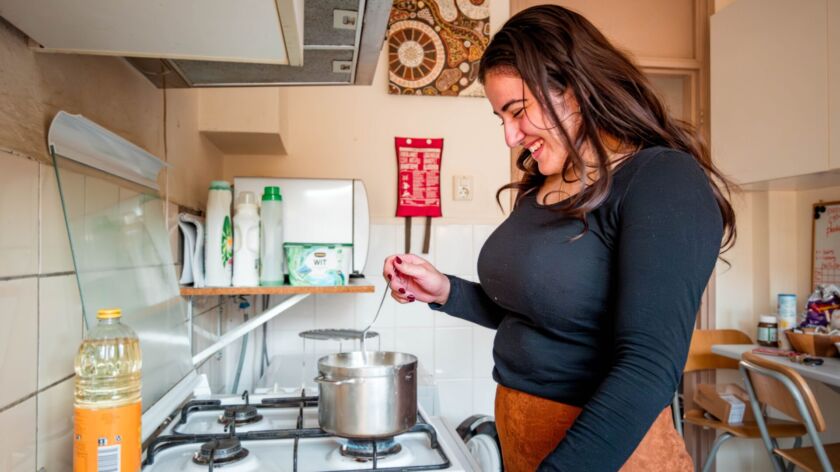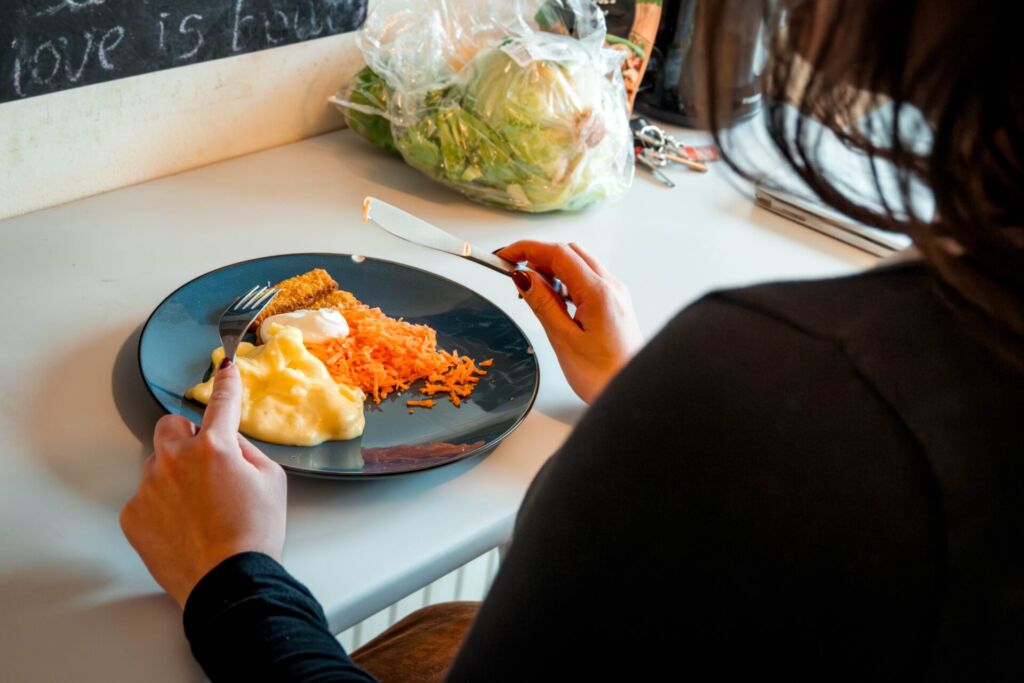Food around the world (1): Finnish fish sticks
-
 Photo: Diede van der Vleuten
Photo: Diede van der Vleuten
Every country has its own unique cuisine. But what’s cooking in the kitchens of Radboud international students and staff? Vox joins internationals in their kitchens to discover what makes their traditional food important – and shares some recipes. Today: Nostalgia and fish sticks.
Tarja Acar opens the door to her home at five p.m. on a Sunday. The 23-year-old International Business Communication student has invited us into the shared kitchen of her student house to prepare a ‘simple yet delicious’ Finnish staple dish: mashed potatoes with fish sticks. ‘Mash with fish sticks is very common. When I think about Finland, it’s one of the first dishes that comes to mind. I had it a lot in kindergarten and school, so I have been eating this for around twenty years.’
While fish sticks are a staple food in many Western countries, everyone has their own way of doing them. While prepping the potatoes for boiling, Acar shares how she likes to serve the crispy bites: ‘To make this more interesting and colourful, I love to add some grated carrots as a side dish and some sour cream to dip the fish sticks in. I also like to add some garlic to the mashed potatoes.’
Acars own culinary background is, however, a bit more international: ‘I’m Finnish-Kurdish, so at home, my mom always made Kurdish food. Everywhere else, I always had more typical Finnish food. I like the Kurdish cuisine, but it’s quite difficult to prepare compared to Finnish dishes.’ That is also one of the reasons the 23-year-old chose the mashed potatoes and fish sticks as a representative meal: ‘I don’t really like to cook, so I’m trying to make it as quick and simple as possible.’
Potatoes and translation
In many ways, Finnish and Dutch food have quite some similarities, she explains while placing the fish sticks in the oven: ‘Finnish and Dutch people both like it basic and simple – we like being practical. Like the Dutch, we also use a lot of potatoes and fish when cooking and season our food mostly with salt and pepper.’
Acar adds: ‘Another reason I chose to make fish sticks is the simplicity of it. It is perfect for students. And the fact that you can serve it with different things makes it a good option for many people. In Finland, we often eat them with spinach pancakes, for example.’

But even if the food is similar in principle, it can still be challenging to cook traditional foods when living abroad: ‘When I first moved here in 2021, it took me forever to do groceries because I had to translate all the ingredients into Dutch. And then sometimes, you still can’t find the right thing. I also typically cook by eyeballing ingredients and experimenting a bit because that is how my mom did it, so that also makes doing groceries in a different country and language a bit difficult for me.’
And then, of course, there are some student-specific difficulties when it comes to cooking traditional dishes. ‘The lack of a proper oven in my shared kitchen is a complicating factor’, she explains. ‘That is why I also don’t cook typical dishes that often.’
Growing appreciation
‘I have never really been nationalistic’, Acar says once she sits down at the table to eat. ‘I also never really thought about the significance of food because of that. However, since moving to the Netherlands, I started to appreciate the things I took for granted much more. I miss my mom’s cooking.’
‘Our traditional food is a big part of ourselves’
‘I have actually started to ask for recipes to cook more myself. But it’s still not the same as cooking at home in Finland because I can’t cook for my siblings, which I love to do. I also do not want to occupy the shared kitchen for too long and make a mess. That’s also why I usually make quick and simple things.’ She jokingly adds: ‘When I go home, I always eat all of the things I can’t get my hands on in the Netherlands.’
‘Food holds a lot of memories. This dish, for example, reminds me of my time in kindergarten and school and how everyone loved it back then.’ But food also holds a deeper cultural and identity-related significance to the student: ‘Our traditional food is a big part of ourselves. We grew up with it, and it holds a lot of meaning because of that, especially when you move abroad and are more separated from your culture.’ Acar elaborates: ‘Sometimes I cook things like this with my Dutch and Finnish friends who also live in Nijmegen. This is a way to share memories and feel a bit closer to home.’
In a side box: the recipe (for 4-6)
Ingredients
1,5 kg of potatoes
200 ml of milk
1 tbs of butter
1 pack of fish sticks
Salt and pepper (to taste)
On the side
1-2 carrots
125 g sour cream
Instructions
- Heat the oven to 200 degrees.
- Peel and cut the potatoes in half. Put the cut potatoes in a pot and add water so that potatoes are well covered. Heat the water until boiling and boil the potatoes for about 15 minutes or until they are soft when tested with a fork.
- Meanwhile place the fish sticks in the oven and bake for around 15 minutes or until golden brown and crispy.
- Drain the water from the potatoes. Heat the milk and butter until warm and add the mixture to the drained potatoes. Puree the potatoes with a staff mixer until fluffy. Season with salt and pepper.
- Serve the mash with the fish sticks.
Tips
- For a more flavourful mash, you can add garlic to the milk and butter mix when heating.
- On the side you can serve grated carrots and/or sour cream.




